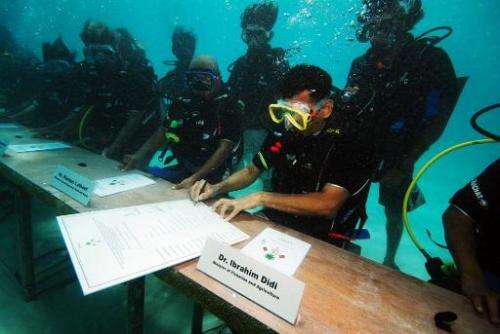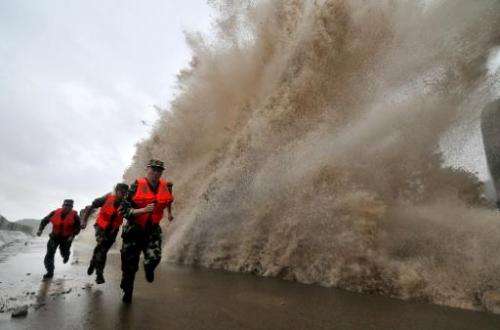EU, island states bitter at Japan's reduced carbon goal

Europe and the world's small island nations reacted with dismay, and green groups with fury, after Japan on Friday slashed its goal for curbing carbon emissions.
The announcement was attacked at the UN climate talks in Warsaw as a heavy blow to an already-troubled negotiation process.
The European Union urged Japan to consider the consequences of its actions, while the Alliance of Small Island States (AOSIS) said the move was "a huge step backwards" for the global effort.
In a press statement, the European Commission said EU members "recognise" Japan's difficulties after the 2011 earthquake and tsunami, which shuttered its nuclear energy sector, but said it should keep its promise.
"While we understand this situation, we expect all countries to stand by their mitigation commitments, and developed countries in particular to continue to show leadership in this respect," the EU executive said.
"Up until now, Japan has been a leader in implementing effective policies to reduce emissions in line with its pledges," the commission said—noting an earlier Japanese pledge to reduce its emissions by 80 percent by 2050.
"The European Union and its 28 Member States call on Japan to consider the implications of the new target for Japan's contribution to international mitigation action."
AOSIS, gathering poor island nations vulnerable to rising seas, accused Japan of retreating on promises it made at the 2009 UN climate summit in Copenhagen.
"AOSIS is extremely concerned that the announcement represents a huge step backwards... and puts our populations at great risk," it said.
"This is neither the time nor the place to be backtracking on commitments made by leaders in Copenhagen."
AOSIS pointed to Super Typhoon Haiyan, which has ravaged islands in the Philippines, as evidence of a dislocated climate system.

"(It) is just the latest in a series of climate-related extreme weather catastrophes," it said.
UN members are striving to conclude a greenhouse gas pact by 2015 that would eventually limit global warming to two degrees Celsius (3.6 degrees Fahrenheit) over pre-industrial levels.
There is also a more ambitious option of 1.5 C (2.7 F), promoted by poor, climate-vulnerable countries.
In 2009, Japan's then centre-left government promised to reduce emissions by 25 percent by 2020 compared to 1990 levels.
On Friday, its conservative successors said the new target was a cut of 3.8 percent by 2020 over levels for 2005.
This amounts to a rise of just over three percent compared to the 1990 benchmark, according to the Japanese environment ministry.
"We were expecting more from the world's third largest economic country. But instead they are racing to the bottom," complained Wael Hmaiden, head of Climate Action Network International.
'Tipping point' feared in climate talks
According to monitoring group Climate Analytics, Japan's new target will widen the global "emissions gap"—the gulf between international carbon pledges and what is needed to meet the 2 C target—by 3-4 percent.
"This historic reversal in Japan's climate policy away from reductions towards increasing its own emissions could become a tipping point, feeding a downward spiral of ambition globally," said policy analyst Marion Vieweg.

Japan is the latest developed country to scale back carbon commitments.
Canada walked away from the Kyoto Protocol in 2011 after years of exceeding its carbon cap, while Australia's new conservative government this week moved to scrap a carbon tax on big emitters.
Such moves are "disgraceful, irresponsible and dangerous," said Meena Raman of an environment and development group, Third World Network.
According to the International Energy Agency (IEA), Japan in 2011 was the fifth biggest emitter of carbon dioxide, the principal greenhouse gas, after China, the United States, India and Russia.
The climate process suffered a double whammy with the announcement by Brazil overnight that deforestation of Amazonia had risen by 28 percent over the past year.
"There is one reason for this unacceptable fact: It follows the approval of the New Forest Code of 2012 which gives amnesty to those who have illegally cut down our forests," said Renata Camargo of Greenpeace Brazil.
"The cattle ranchers and soy producers are the ones behind the destruction of the rainforest," said Dag Hareide, director of Rainforest Foundation Norway.
"They've been led to believe that they can act with impunity."
© 2013 AFP




















